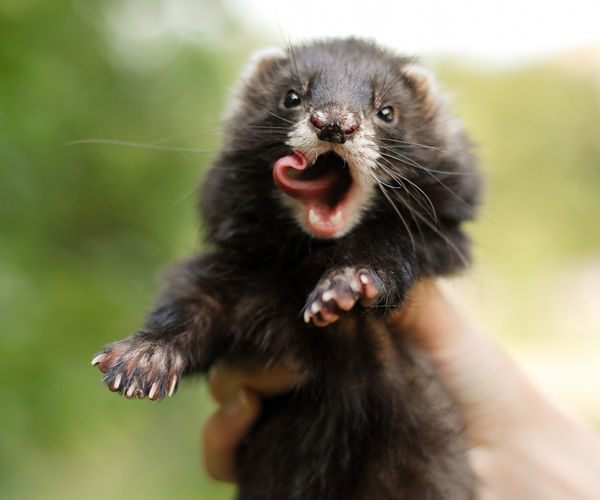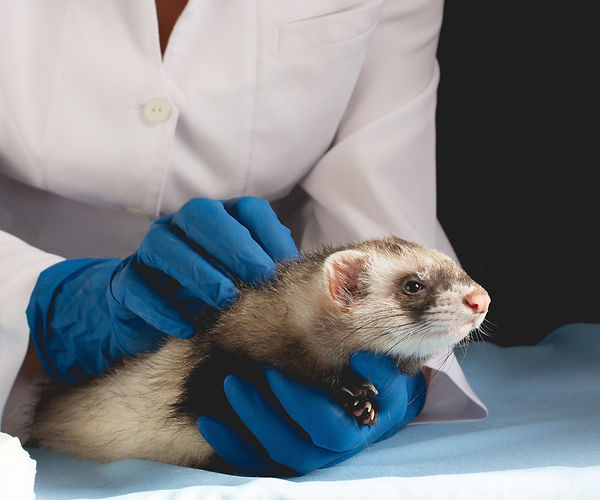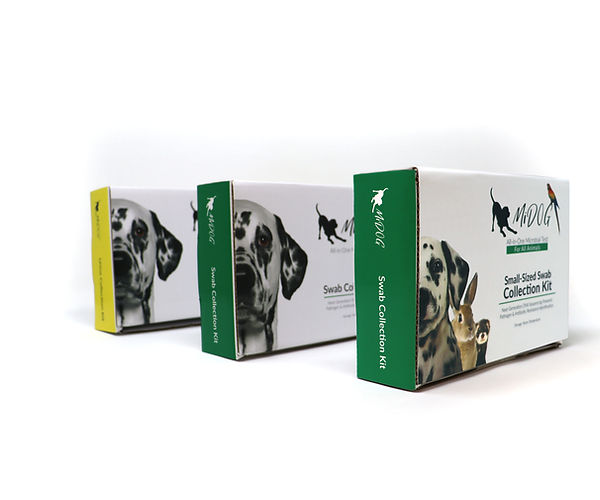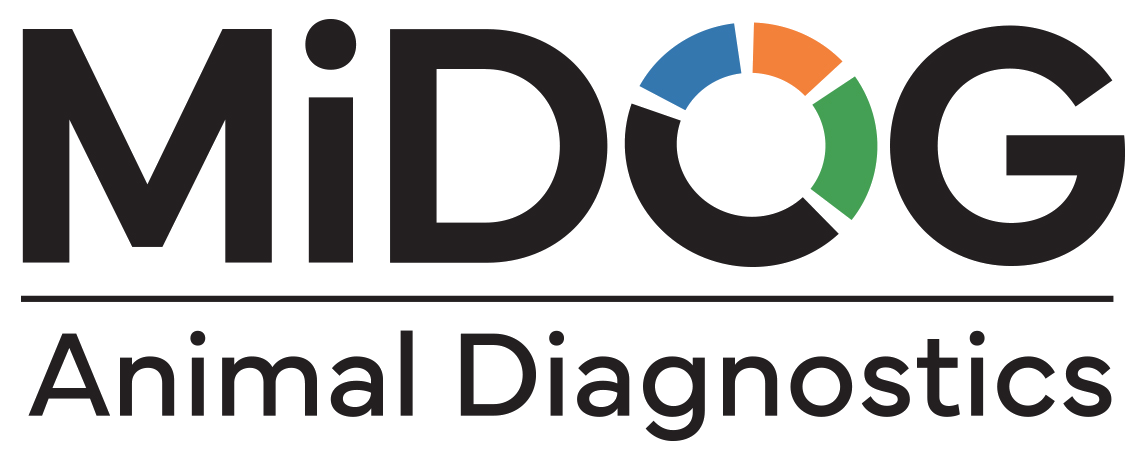
Is your favorite, meat-eating friend suffering from loose, watery stool? While the cause of diarrhea in ferrets ranges greatly, one common cause can be a disruption to their gut microbiome. If your ferret seems to be suffering from prolonged gastrointestinal issues (more than 2 days), it is worthwhile to take your furry friend to a ferret veterinarian since your ferret may have a gastrointestinal infection. Diarrheal diseases are painful and if left untreated can result in dangerous complications, and so early identification and intervention is beneficial.
What Causes Diarrhea in Ferrets?
Ferrets have a unique body shape that actually predisposes them to gastrointestinal disorders [1]! Ferrets are small, carnivorous mammals that eat a high protein, low carb and sugar diet [1]. These small mammals have a short transmit time, which means they defecate the food they eat faster than other animals. Specifically, when ferrets are healthy they defecate every 148-219 minutes [2,3]. Moreover, the stool they do expel is formed but slightly soft, which can make it difficult for new pet owners to differentiate from actual diarrhea [2,3].
Diarrhea in ferrets presents as a frequent, watery type of stool. There are a variety of reasons why a ferret may develop diarrhea including intestinal parasites, dietary changes, foreign bodies, cancer, stress, and notably, infectious diseases. Common bacterial infections in ferrets include Helicobacter spp., Clostridium spp., Campylobacter spp., Lawsonia intracellularis, and Salmonella spp. [3,4]. This can cause inflammation, which in turn can help harbor infectious pathogens that can go on to cause chronic infections.

The image above depicts a ferret being examined by a veterinarian.
When Should I Bring My Ferret to the Veterinarian?
Veterinarians often categorize ferrets that have diarrhea as having mild, moderate, or severe symptoms:
- mild: diarrhea, but no other symptoms
- moderate: diarrhea and mild additional symptoms (such as decreased appetite)
- severe: diarrhea along with serious additional symptoms (vomiting and complete loss of appetite)
Moderate to severe presentations of diarrhea warrants a veterinary visit as soon as possible. Mild presentations lasting over two days also warrant a veterinary visit. Annual wellness checks are also recommended to help identify any lifestyle changes that can prevent illness!
Treatment of Diarrheal Disease in Ferrets
Fortunately, the prognosis for ferrets with mild or moderate diarrhea is very good, as ferrets often make a full recovery. Severe presentations require intensive interventions. If you think your ferret may have diarrhea, the best thing you can do is get a quick and accurate diagnosis from your vet as soon as you notice symptoms. Delay in care puts your furry friend at risk for severe complications, including metabolic disturbances, dehydration, organ damage, and death. An antibiotic treatment plan may also be advised if an opportunistic pathogen is found to be the source of the infection, and your veterinarian may provide dietary lifestyle changes.
Advancements in Ferret Gut Microbiome Detection
Unfortunately, antibiotic-resistant gut bacteria in ferrets is on the rise.
Prescription of broad-spectrum antibiotics has historically been guided by bacterial culture and sensitivity results, although increasing evidence suggests the diagnostic shortcomings of culture-based approaches [1]. Specifically, next-generation sequencing (NGS) and metagenomics analysis are increasingly being used to assess the ferret fecal microbiome [3,4,5,6]. Previous studies have identified Mycobacterium spp, Campylobacter jejuni, Lawsonia intracellularis, Salmonella spp., Clostridia spp., Enterococcus spp., Escherichia spp., Staphylococcus spp., Streptococcus spp., and more in ferret feces [7, 8, 9]. Moreover, researchers have identified penicillin, streptomycin, and vancomycin resistance in high percentages (>80%) of the bacterial isolates of healthy ferret feces [7]. With <1% of microorganisms able to be cultured, in addition to the alarming rate of antibiotic resistant strains of gut bacteria in ferrets, NGS technologies are becoming even more important for the clinical diagnostics of ferret gastrointestinal disorders.
The MiDOG All-in-One microbiome test may provide the answer to the diagnostic conundrum that diarrhea poses on your ferret. Utilizing Next-Gen Sequencing technology to detect and quantify all microbial DNA through untargeted and comprehensive sequencing and quantitative comparisons to reference databases, the MiDOG NGS technology provides a useful opportunity to shed light on the microbial makeup of your ferret’s infection for clinical application. The MiDOG microbiome test is a microbial identification test grounded on scientific research that provides veterinarians DNA evidence for the guided treatment of ferret gastrointestinal infections.

Find out if your vet uses MiDOG before you book your next appointment!
For health-related questions about your ferret or other exotic pet, reach out to a veterinarian that specializes in exotic pets.
References
- Lennox, A. (2005). Gastrointestinal Diseases of the Ferret. Veterinary Clinics Of North America: Exotic Animal Practice, 8(2), 213-225. doi: 10.1016/j.cvex.2005.01.004
- Johnson-Delaney C.A. A clinician’s perspective on ferret diarrhea. Exotic DVM. 2004;6(3):27–28.
- Hoefer, H. (2020). Gastrointestinal Diseases of Ferrets. Ferrets, Rabbits, And Rodents, 27-38. doi: 10.1016/b978-0-323-48435-0.00003-4
- Sun, X., Olivier, A., Yi, Y., Pope, C., Hayden, H., & Liang, B. et al. (2014). Gastrointestinal Pathology in Juvenile and Adult CFTR-Knockout Ferrets. The American Journal Of Pathology, 184(5), 1309-1322. doi: 10.1016/j.ajpath.2014.01.035
- Huynh, M., & Pignon, C. (2013). Gastrointestinal Disease in Exotic Small Mammals. Journal Of Exotic Pet Medicine, 22(2), 118-131. doi: 10.1053/j.jepm.2013.05.004
- Dugyala, S., Ptacek, T., Simon, J., Li, Y., & Fröhlich, F. (2020). Putative modulation of the gut microbiome by probiotics enhances preference for novelty in a preliminary double-blind placebo-controlled study in ferrets. Animal Microbiome, 2(1). doi: 10.1186/s42523-020-00030-y
- Nizza, S., Rando, F., Fiorito, F., Pagnini, U., Iovane, G., & De Martino, L. (2014). Fecal microbiota and antibiotic resistance in ferrets (Mustela putorius furo) from two captive breeding facilities in Italy. Research In Veterinary Science, 96(3), 426-428. doi: 10.1016/j.rvsc.2014.03.015
- Bahl, M., Hammer, A., Clausen, T., Jakobsen, A., Skov, S., & Andresen, L. (2017). The gastrointestinal tract of farmed mink (<i>Neovison vison</i>) maintains a diverse mucosa-associated microbiota following a 3-day fasting period. Microbiologyopen, 6(3), e00434. doi: 10.1002/mbo3.434
- Xiang, Z., Zhu, H., Yang, B., Fan, H., Guo, J., & Liu, J. et al. (2020). A glance at the gut microbiota of five experimental animal species through fecal samples. Scientific Reports, 10(1). doi: 10.1038/s41598-020-73985-2
